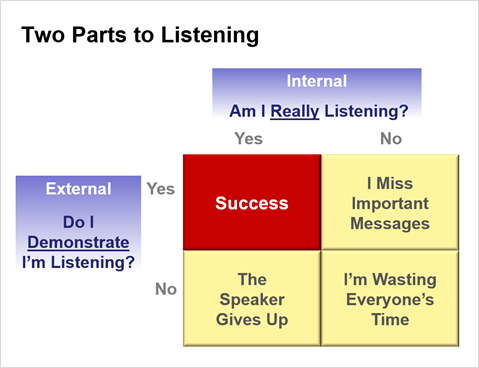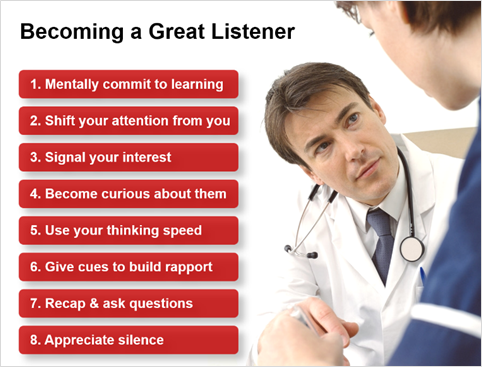1. Becoming a great listener
8 Tips for becoming a better listener.
You have two listening goals for your customer interviews. The first is to ensure you are really listening to what the customer is saying. (This is the “internal” part… what’s going on in your head.) The second is to demonstrate that you are listening to them. (This is the “external” part… what the customer can observe.)

You can learn how to get better at both in e-Learning Module 11: Listening Skills (at www.blueprintingcenter.com > e-Learning). For now, let’s address the fundamentals, beginning with the internal part. Later, we’ll cover the external part in the BlueHelp article, The PEAR listening method.
If you want to become a great listener, work on these 8 practices:

- Before your meeting, mentally commit to learning. A wise man once said, “I am defeated and know it if I meet anyone from whom I cannot learn something.”
- When you begin the meeting, shift your attention from its natural resting place—yourself—to the other person. This means being OK with an entire conversation that’s not about you at all.
- Physically signal to the speaker that you are interested. We’ll talk more about this in a few moments… but get rid of distractions, give them strong eye contact and position yourself to pay close attention to them.
- Become curious about what the speaker is saying. Don’t be satisfied with a superficial understanding… seek to understand why they are saying what they are saying.
- Use your thinking speed. You can think 2-4 times faster than the other person speaks. Don’t let your mind wander. Instead use this time to think hard about their message.
- Give cues to the speaker to build rapport… such as a few nods of the head and an affirming smile.
- Periodically recap the gist of their message, and ask pertinent questions. Recapping is especially helpful, because committing to this forces you to listen hard.
- Finally, appreciate silence. If the speaker is thinking, don’t rush in to fill the void. This is especially important in a customer interview, when you’re looking for deep thinking, not chatter.
Keywords: listen, listening, great listener, thinking speed, build rapport, listening cues, appreciate silence, become curious, recap, signal interest